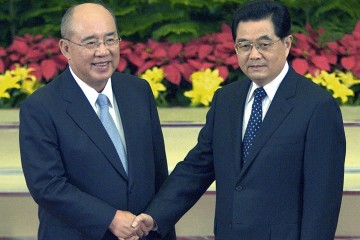Among recent developments have been the establishment of direct air, sea and postal links across the Strait and China’s stated willingness to help Taiwan financially in the context of the global financial crisis. Hu’s six proposals seem to have taken that process further, although how far is yet to be determined. The debate on the meaning and intent of the proposals will continue for some time.
Apart from the direct reference to the DPP, none of Hu’s six proposals are new, but they are addressed to a different government in Taipei. The immediate response from Taiwanese officials, including the foreign minister, Francisco Ou, and from the ‘blue’ leaning media, has been positive, although Ma has as yet responded only briefly, indicating little at this stage.
The Hu proposals could be seen as a response, as Ma suggests, to a number of propositions thathe has put forward for improving cross-strait relations, including calling for a ‘diplomatic truce’ and a ‘mutual non-denial’ (that Taiwan and China should not deny each other’s existence). Unsurprisingly the independence-oriented DPP is less enthusiastic.
In a general sense, and in the use of more restrained language, Hu’s proposals appear to contain positive elements and presumably they are meant to. They may nevertheless be difficult for Taiwan to take further. On the surface, Hu shows little sign of compromise on the ‘one China principle’ and only a minor reference was made to the ‘1992 consensus’, that both sides recognise there is only one China but agree to differ on the definition of that one China. This consensus is an important basis for Ma’s approach to cross-strait relations and for Taiwan’s ongoing talks with the mainland, even though it is interpreted more narrowly by China. Ma has committed not to discuss politics with China in this administration but this may be difficult in developing a peace accord and a means for participating in WHO meetings, a litmus test for Ma, without impinging on the claims to sovereignty of one side or the other.
Yet the proposals for a peace accord and for non-confrontation do reflect a welcome lowering of temperature in the relationship. A more substantial move to assuage Taiwanese fears of China, however, would be to reduce the 1000 or so missiles targeting Taiwan across the strait – a move not mentioned by Hu although rumoured to be a possibility, in Taiwan.
So is Hu’s speech a positive development? It’s certainly encouraging for the international community. It suggests a further lowering of tensions across the Strait and reduced risks for countries that could possibly be caught up in any cross-strait conflict – including Australia.
For the Taiwanese it depends upon whether they see their future tied more closely to China, or whether these developments are seen as a part of a clever move toward bringing Taiwan increasingly within China’s political as well as economic orbit. Presumably this, of course, is China’s hope. Whether Ma will see them as an adequate response, given his own by no means universally welcomed flexibility towards China, may be open to question. More generally, although undoubtedly a positive development potentially, and one that ameliorates if not resolves the bilateral issues, we have yet to see how far the basic dynamics of the cross-strait problem have changed.

